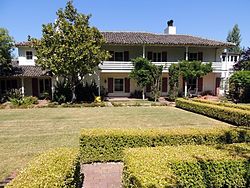Eugene O'Neill National Historic Site
|
Tao House
|
|

Tao House in summer
|
|
| Location | Kuss Road, Danville, California |
|---|---|
| Coordinates | 37°49′28″N 122°1′47″W / 37.82444°N 122.02972°WCoordinates: 37°49′28″N 122°1′47″W / 37.82444°N 122.02972°W |
| Area | 158.6 acres (64.2 ha) |
| Built | 1937 |
| Architect | Frederick Confer |
| Architectural style | Monterey Colonial |
| Visitation | 3,652 (2005) |
| Website | Eugene O'Neill National Historic Site |
| NRHP Reference # | 71000137 |
| Significant dates | |
| Added to NRHP | May 6, 1971 |
| Designated NHL | July 17, 1971 |
| Designated NHS | October 12, 1976 |
The Eugene O'Neill National Historic Site, located in Danville, California, preserves Tao House, the Monterey Colonial hillside home of America's only Nobel Prize-winning playwright, Eugene O'Neill.
Eugene O'Neill had won the Nobel Prize for Literature in 1936, and used the prize money to build what he named Tao House above Danville. O'Neill and his wife lived in the home from 1937 to 1944. At this home, O'Neill wrote his final plays: The Iceman Cometh, Long Day's Journey Into Night, Hughie, and A Moon for the Misbegotten. Due to a degenerative condition in his hand, he was unable to complete another play after 1943.
O'Neill and his wife, actress Carlotta Monterey, showed their interest in Asian art, decor, and thought in preparing the home. The ceilings were dark blue to mimic the sky with dark wood floors representing the earth, as well as Noh masks, Chinese guardian statues, and Chinese lacquerware furnishings throughout the interior. Outside, Carlotta installed a garden in a zigzag pattern which Chinese tradition indicated would keep away evil spirits. They also planted several trees, including pine, almond, and redwood. The O'Neills moved to Boston after World War II.
The house was saved from demolition in the early 1970s. Several women formed the Eugene O’Neill Foundation, including president Darlene Blair and executive vice president Lois Sizoo, in order to raise money to buy Tao House, which had been named a National Landmark in 1971. They did so through several fundraising projects, including benefit performances of Eugene O’Neill’s play Hughie featuring Jason Robards. Through their efforts, Tao House was declared a National Historic Landmark in 1971, a National Historic Site in 1976, and passed into the management of the National Park Service in 1980.
...
Wikipedia


